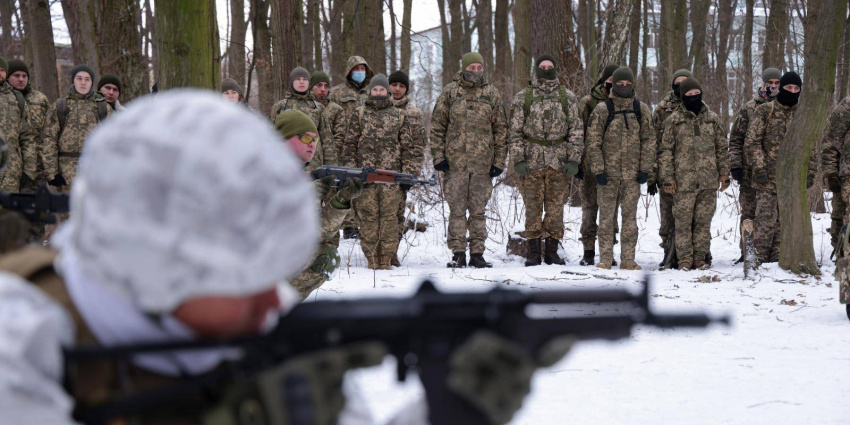Habermas and the Russia-Ukraine War: A Gandhian Critique

The German philosopher Jurgen Habermas has recently lend his voice to the chorus of approbation against Putin's war in Ukraine. In a nuanced article that reflects Habermas' long-standing left-liberal political views, Habermas has called for a negotiated settlement of the conflict, warned against the Western media frenzy, as well as against the war's potential danger of culminating into a wider war with the Western powers, counselling the latter about the "risky poker" of direct involvement. In light of the huge influx of Western arms into Ukraine, Habermas argues that the ball is in Putin's court and Putin decides "when the West crosses the threshold...beyond which he regards military support for Ukraine as the West's entry into war." The West's dilemma, however, is that "the West cannot allow itself to be blackmailed at will" and that "leaving Ukraine to its own fate" is wrong and the West must see to it that "the Ukraine must not lose the war." Accordingly, Habermas supports the on-going US-led campaign of military assistance to Ukraine "up to the point of direct participation."
On one level, Habermas makes sense. Under the UN Charter, Ukraine has the right of self-defense against the Russian aggression and there is no ambiguity as to which side of the isle international laws and norms fall in this conflict. Habermas is also on the mark when he refers to the German and other European politicians' falling prey to Kyiv’s "moral blackmail," but much less so when praises the German Chancellor Olaf Scholz for his "objectively comprehensively informed consideration," in light of Scholz's decision to provide Ukraine with sophisticated tanks and anti-aircraft batteries, complementing the American fateful decision to dispatch heavy military equipment to Ukraine. Overall, the combined effort of US, France, England, Germany, and other NATO countries' growing involvement in the war is tantamount to the steady NATO-ification of the war, to coin a term.
But, on another level Habermas' interpretation falls woefully short. A war must be studied in its totality and it is a sheer error to portray this conflict in Manichean zero-sum terms without due consideration of the important intervening variables such as NATO's hegemonic expansionism, American realpolitik vis-a-vis Russia in the "post-Cold War" era in general and the sheer power-politics by US President Joe Biden in particular. The latter has resulted in the glaring absence of any US peace strategy toward this conflict, supplanted by an insatiable desire to "weaken" Russia, per the admission of US military leaders, through what inescapably appears to be a proxy war at the expense of innocent Ukrainian civilians. Should this pattern of war continue, Ukraine will be further devastated and turned into Europe's Syria, with millions of Ukrainian refugees and internally displaced population, with no end in sight. Commensurate with the NATO-ification of the war is a make-believe "Ukraine can win" narrative loyally disseminated throughout the compliant Western media, thus setting the stage for the deadlocked peace negotiations, under the false pretense that time is on the side of Ukraine, when in fact every day this calamitous war exacts more victims in Ukraine and must be brought to an immediate end through an internationally-sponsored cease-fire.
Lest we forget, in 1999 Habermas also supported the illegal 11-week NATO bombing of Serbia, naively misconstruing NATO's (unauthorized offensive) as a "leap to a cosmopolitan law of global civil society." Sadly, the passage of time has not helped Habermas with improving his own "systematic distortion," which is a tissue of erroneous interpretation of global power politics where the US-led military alliance dutifully serves America's hegemonic interests, rather than "human interests," which dictates a transition toward a post-bloc alliance warranted by today's globalization. But, of course, the Russia-China alliance, e.g., through the BRICS nations and the Shanghai Cooperation Organization, denote the complexity of the current global trajectory, with competing east and west "truth-claims" to use a Habermasian jargon.
A Gandhian Critique of Habermas
Indeed, Mahatma Gandhi and his venerable tradition of non-violent resistance provide a timely corrective to the egregious errors of Habermas, above all, his naive assumption that the West's intentions in Ukraine are entirely noble and Western military arms to Ukraine does not amount to acting as arsonists in the house and adding kerosene to the fire. To recall Gandhi's 1940 letter to Hitler, he aptly predicted the futility of Hitler's military solutions to the European conflicts and reiterated the principles of non-violence, which are as relevant today as they were back then.
In turn, this raises an important question: Wouldn't Ukraine benefit more from the application of Gandhian non-violent resistance than by following the American and German blueprint, which will likely seal Ukraine's fate as a devastated country? Gandhian approach is not to be confused with capitulation to Russia, but rather resorting to alternative courses of action, including non-cooperation with the Russian occupiers, mass protests, mass strikes, petitions, sit-ins, and the like, i.e., a whole panoply of action directed toward the illegitimacy of Russian invasion, compared to an 'asymmetrical warfare' that has pitted a military superpower against its weaker neighbor standing up heroically for its sovereign rights. Contrary to Habermas, who has misinterpreted NATO's offensive postures as a "new military humanism," a Gandhian approach would call a spade a spade, without succumbing to such egregious errors of interpretation, culminating in a righteous call for a neutral Ukraine. Sadly, instead of making this urgent call, dictated by the very inner sanctum of Habermasian theory, Habermas has failed the tests of his own corpus of thought and, in effect, turned into a rationalizer of NATO's undeclared war on Russia. The Ukrainian tragedy, however, is the latest reminder of the urgent necessity of returning to the wisdom of non-violence.
* For the author's critique of Habermasian theology read:

